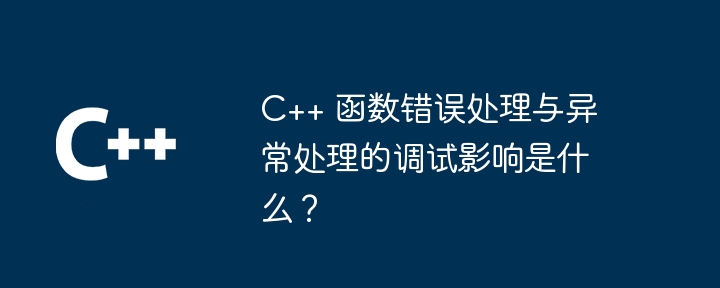Home >Backend Development >C++ >What are the debugging implications of C++ function error handling and exception handling?
What are the debugging implications of C++ function error handling and exception handling?
- 王林Original
- 2024-04-23 13:33:011193browse
In C, function error handling uses errno to store error codes, making debugging difficult. Exception handling throws exception objects to make debugging easier, providing useful error messages and explicit code paths.

Debugging Impact of C Function Error Handling and Exception Handling
In C, programmers can use two main mechanisms to Handling error conditions in functions: Function error handling and exception handling. Each mechanism has its advantages and disadvantages, as well as some different implications in terms of debugging.
Function error handling
Function error handling is the simplest form of error handling in C. It involves using the errno global variable to store the error code and then checking this code in a function to determine if an error occurred.
Debugging function error handling can be difficult because error codes are often not intuitive and can vary between libraries and platforms. Additionally, function error handling can lead to implicit code paths that are difficult to track because error codes can be set anywhere in a function call.
Exception Handling
Exception handling is a more modern approach to handling error conditions in C. It involves throwing exception objects that represent specific errors that occurred. Exception objects can be caught and handled in subsequent code, allowing applications to respond to errors in a structured way.
Debugging exception handling is somewhat easier than debugging function error handling because the exception object provides useful error information and the exception handling code path is usually more explicit.
Practical Case
Consider the following code example, which demonstrates the difference between function error handling and exception handling:
// 函数错误处理
int divide(int a, int b) {
if (b == 0) {
errno = EDOM; // 设置错误代码
return -1; // 返回错误值
}
return a / b;
}
// 异常处理
int divide_exc(int a, int b) {
if (b == 0) {
throw invalid_argument("除数不能为零"); // 抛出异常
}
return a / b;
}
int main() {
// 函数错误处理
int result = divide(10, 0);
if (result == -1) {
// 检查错误代码
if (errno == EDOM) {
cout << "除数不能为零" << endl;
}
}
// 异常处理
try {
int result = divide_exc(10, 0);
cout << result << endl;
} catch (invalid_argument &e) {
// 捕获并处理异常
cout << e.what() << endl;
}
return 0;
}In Function Error Handling In the example, debugging the code can be difficult because the error code EDOM is not very intuitive. In contrast, in the exception handling example, errors can be more easily identified and handled by catching the invalid_argument exception and accessing its what() member function.
Conclusion
Function error handling and exception handling are two different ways of handling error conditions in C. Each mechanism has its advantages and disadvantages and has different implications in terms of debugging. Exception handling is generally easier to debug because it provides useful error information and a clearer code path. Exception handling is especially useful when errors need to be handled in multiple parts of the application.
The above is the detailed content of What are the debugging implications of C++ function error handling and exception handling?. For more information, please follow other related articles on the PHP Chinese website!

